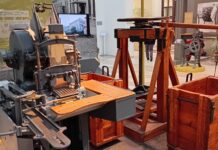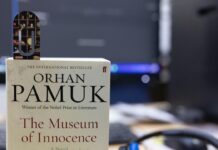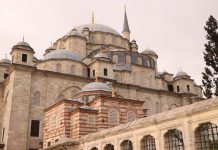Thursday, 11 October
The next morning I walked out of Gelendost in the rain, which let up a few kilometers later as I entered a small village of about 1,500 people. On my left was a school where a bunch of little kids were outside doing their morning jumping jacks. A wave of excitement spread through the crowd as the kids spied a foreigner with a backpack coming their way. Calls of “hello, hello” began in heavily accented English.
Two girls ran out to the fence to greet me and invite me to join them for their exercises. I looked around for a teacher, but the children seemed unsupervised. Maybe the teacher had gone inside for a minute or two and would be returning, I thought. I decided to enter the schoolyard and find the teacher to see if I might offer my assistance by joining them all in some exercises or helping out in the classroom for a while as a novelty for the students.
The two girls gasped and began giggling when they saw that I was turning toward the schoolyard. Their classmates, jumping jacks forgotten, stampeded to the fence and ran alongside it, screaming and cheering as I neared the gate.
When I walked through the gate into the schoolyard, an older man, who introduced himself as the principal, intercepted me. He had come out into the yard to see what the commotion was all about.
He greeted me and said, “Why don’t you come inside and we’ll have a cup of tea.” I knew he didn’t want me to get the kids any more riled up than they already were.
I accepted his invitation, happy to avoid the tidal wave of excitement building amongst the students. The principal walked me up a flight of stairs to his office in the administration building and gestured for me to sit in a chair across the desk from him. A massive portrait of Atatürk rose high like a shrine on the wall behind him. Next to the portrait hung several framed Atatürk quotes. I was not surprised since nearly all public offices and most private offices contained such shrines to Atatürk. Atatürk is the icon for secularism in Turkey.
Also, Atatürk has a reputation for being open to the outside world and for being an open-minded leader. So I thought, If this principal worships Atatürk so much, then I’m probably on friendly ground here and he is probably fairly open-minded even though this is a smaller village.
The principal initiated the small talk:
“Where are you going?”
“I am going to Van,” I answered, “but first I will go through Konya. Have you been to Konya?”
“It is a nice city, but there are too many religious fundamentalists there.”
He turned and pointed to the portrait of Atatürk. “Are you familiar with the works of Atatürk?” he asked.
“Yes, of course. He was a great man.”
“Yes, he was. Where are you from?”
“I am from the USA.”
“I don’t like Americans. They are killers.”
I hadn’t been called a killer before. I bit my lip and reminded myself to be patient.
“What do you mean?” I asked.
“Well, they kill Palestinians, they kill Iraqis, they kill each other.”
I didn’t want to make any more of an enemy than I already had, so I tried to steer the conversation to more neutral subjects.
“So how far is Konya from here?” I asked.
Disregarding my attempt to steer the conversation to more neutral subjects, he continued his tirade against all things American or foreign. Then, without skipping a beat, he mentioned that things were kind of difficult at the school right now.
“And why is that?” I asked. He told me that he’d just lost his English teacher.
Gee, I wonder why I thought to myself. But instead, I just nodded and looked concerned. “I want to continue language education for the students,” he continued.
I did some quick mental calculations and thought Well, I have some flexibility in my schedule. I said, “If you need a teacher I’d be happy to come back here and help out for a couple of weeks while you get a replacement.”
He said, “Thank you very much for the offer, but you are not welcome at this school. You are American, and you would be a bad influence on the children. Besides, the community would not be happy with me for hiring a killer.”
My offer of assistance refused, and having been told by this man that he did not like my kind, that we were haters and killers, I thanked him, wrapped up the conversation, and took my leave. Besides, it was starting to get noisy out in the hall, and a few of the children had started knocking on the door and trying to find excuses to come in. At that, the principal escorted me outside to the school gate and we said our goodbyes. I never got to play with the children.
I walked further into the village for about ten minutes and spotted a group of middle-aged men sitting at a teahouse across the street. They waved me over. I crossed the street, said hello, and pulled off my pack. The men were busy discussing the plight of the world. When I sat down, the conversation turned to which recent US presidents were Jews.
“George W. Bush, was he a Jew?” they asked me.
“I’m not sure,” I replied.
“Obama, he’s definitely a Jew.”
“Okay, if you say so,” I replied. “I didn’t know that.”
“Clinton, though, he wasn’t a Jew.”
“Okay, good to know.”
God, the people in this town are bigots, I thought to myself. I had only been sitting for a few moments, but I was already finished with this conversation. I put down my tea, shook hands with the men, pulled on my pack, and walked toward the edge of the village. Man, bigotry does not have a profile, I thought to myself. Young, old, secular, religious, educated, not educated, I have no idea when I meet a person what their views of the world are. And if I ever think bigotry does have a profile, I’m probably the one being bigoted.
A few kilometers later, a farmer harvesting vegetables in his field called out to me. I walked over and shook his hand. He handed me a squash. I thanked him, walked back out to the road, and continued my walk, this time carrying a squash.
I didn’t have a knife or any utensils, and there weren’t any gas stations outside the villages in this area, so when I reached a bend in the road, I hid behind a tree and disposed of the squash.











